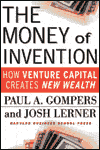|
| ||


A Business Forum Book Review:
Venture Economics reported that venture investing dropped to $7.7 billion during the third quarter of 2001 -- 31 percent lower than the previous quarter, and 73 percent lower than the record $28.5 billion invested during the third quarter of 2000. Most significantly, only 19 percent ($1.5 billion) of these funds went into initial investments in new ventures in contrast to approximately 37 percent during the peak of the boom a year earlier. In fact, much of the VC activity during this period was a purging and realignment of portfolios, typically exiting problem companies.Venture Capital during the past year or two is often lumped in the popular consciousness with the Tulip Mania of the Seventeenth Century or the South Sea Bubble of the Eighteenth Century. "Greedy," "Speculative," "Opportunistic," and "Irresponsible" are some of the pejorative adjectives bandied about in the media. Actual, paper, and hoped-for fortunes have been lost during the economic turmoil of 2000 - 2001, and Venture Capital -- the swashbuckling hero of the 1990s -- is now being castigated as an economic pariah.
While the focused and institutionalized venture capital firms that began to emerge by the mid Twentieth Century may appear to be a new phenomenon, venture capital has been a critical part of capitalism since the earliest days of commerce. Persons financing the voyages of the Yankee clipper ships were intrepid venture capitalists. Venture capital is a basic element of investment banking. What is "new" is the recognition that the identification, evaluation and management of the capital requirements for new and emerging ventures demands skills, information and disciplines that are quite different than those employed in investment banking with established enterprises. A relatively mature industry has now arisen during the past half century to deliver the specialized financial services and resources needed by these new and emerging ventures.
Acknowledging the "mystery and cliché" shrouding this industry, The Money of Invention: How Venture Capital Creates New Wealth, by Paul A. Gompers and Josh Lerner (Harvard Business School Press, 282 pages, $29.95) offers a thoughtful exposition of the venture capital industry and its indispensable function in the economy. Their premise and conclusion:
 "No matter how we look at the numbers, venture capital clearly serves as an important source for economic development, wealth and job creation, and innovation. This unique form of investing brightens entrepreneurial companies’ prospects by relieving all-too-common capital constraints. Venture-backed firms grow more quickly and create far more value than their nonventure-backed firms. Similarly, venture capital generates a tremendous number of jobs and boosts corporate profits, earnings, and workforce quality. Finally, venture capital exerts a powerful effect on innovation."
"No matter how we look at the numbers, venture capital clearly serves as an important source for economic development, wealth and job creation, and innovation. This unique form of investing brightens entrepreneurial companies’ prospects by relieving all-too-common capital constraints. Venture-backed firms grow more quickly and create far more value than their nonventure-backed firms. Similarly, venture capital generates a tremendous number of jobs and boosts corporate profits, earnings, and workforce quality. Finally, venture capital exerts a powerful effect on innovation."Perhaps of special interest to startups and emerging ventures, Gompers and Lerner first focus on the four basic questions financiers must resolve before committing capital to a venture:
Uncertainty about the future
... Technological uncertainty
... Financial uncertainty
Information gaps
... Innovators’ informational advantages
... Investors’ informational advantages
"Soft" assets
... Patents and trademarks
;... Human capital
... Future investment opportunities
Volatility of current market conditions
... Financial-market flaps
... The product-market pendulumEntrepreneurs’ most important task is to provide their prospective investor(s) with realistic and educational answers to these questions -- proactively. Both parties grow through this process. Entrepreneurs should welcome the intense scrutiny of the venture capitalist with the same appreciation as the intense scrutiny of one’s physician; the questions and answers may not always be what we hope to hear, but an open and responsive "partnership" can lead to our best long-term health.
Then looking at the venture capital side of this relationship, The Money of Invention emphasizes that "... Good investment strategies should utilize:
Detailed due diligence and deal screening based on intensive industry knowledge and important networks of experts.
Staging of investments to explicit milestones that are carefully thought out to correspond to the resolution of uncertainty.
Syndication of investments to gather more information and diversity risk.
Equity ownership and incentive compensation for senior management to directly link the interests of investors and the entrepreneur.
Selective use of covenants and restrictions in critical areas that limit the potential conflicts that may arise.
Carefully thought out boards of directors that provide oversight, strategic advice, and credibility to the company."
In addition to "The Entrepreneur’s Challenge" and "The Venture Capitalist’s Challenge," an important part of this book is Part III -- "The Emulator’s Challenge." Many corporations, universities and other non-profit institutions as well as the federal, state and foreign governments have sought to emulate the heady successes of the venture capital firms in fostering innovation within their constituencies. Their performances have generally been disappointing. "The desire on the part of corporate and government officials to emulate its workings is understandable, but translating the venture model poses a number of hazards. While being aware of these pitfalls cannot guarantee success, corporations and other emulators can substantially increase their probability of doing well." Gompers and Lerner then offer specific and practical proposals to enhance the effectiveness and success of these important alternative sources of venture capital.
Predictably, these two Harvard Business School professors present a profusion of vivid cases to illustrate both failures and successes in each part of this work. These authentic cases coupled with the authors’ commentaries assure immediacy and realism.
After the brusque awakening during the past two years, Gompers and Lerner believe "venture capital is likely to undergo even more radical transmutations," reminiscent of the shakeout experienced by the investment banking industry during the 1960s. Therefore, the book concludes with a thoughtful exploration of the "dramatic change in the structure of the venture industry" they envision over the next decade. Their conclusion: "... venture firms will have to rethink the way they do business in three key ways if they want to secure a top position for themselves in the industry:
Generate more fee income
Leverage venture capitalists’ time
Build venture 'brands'"
"... a handful of industry leaders will likely dominate the field -- leaders who will command far greater financial and human resources that their competitors. Though niche funds will continue to operate, specializing in particular regions and industries, the demarcation between top-level organizations and their competitors will widen even further. In addition, new, agile players will join seasoned groups in jockeying for positions at the top rungs of the hierarchy."
At an historic moment when the venture capital industry appears to be badly bruised, The Money of Invention offers a constructive assessment of the questions currently confronting the industry and its prognosis for the future. Both the Entrepreneur and the Venture Capitalist will find Gompers and Lerner’s work to be timely, analytical, and pragmatically helpful.
|
Email: editor@businessforum.com
227 Fuller Street |
URL: http://www.businessforum.com/vc.html
Revised: November 29, 2001 TAF
© Copyright 2001 Thomas A. Faulhaber / The Business Forum Online®, All Rights Reserved